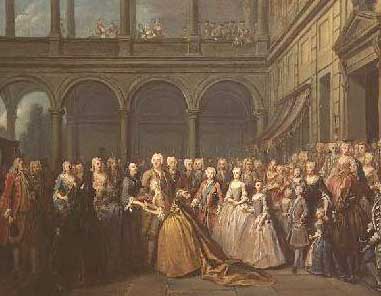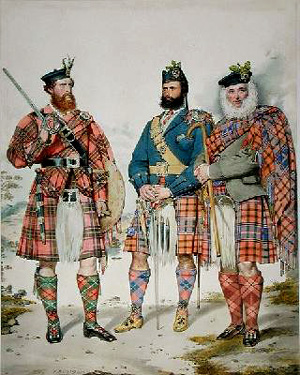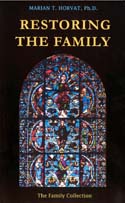 |
Organic Society
The Clan and the Family
Plinio Corrêa de Oliveira
What is a clan? We have the simple family composed of father, mother and children. Then we have the extended family that we have spoken of composed of the adult children, grandchildren and great-grandchildren with strong organic relations among the members and a deep bond with the founder. This family has a great unity and in itself constitutes a small kingdom.

Members of the extended family of Brunswick-Lunebourg meet at Neuhaus in Bohemia in 1737
|
However, it is not rare that after the founder and the first descendents of a family have died and the family has multiplied, that in some of its branches the familial bounds can lose their first intensity, although continue to maintain some unity. It has become a family so extended that we cannot call it family any longer. But it is not so extended that we can confuse it with the population of a rural area or a city. So, we call it a clan.
The clan is more vague in its composition than the initial family. It is, so to speak, a broader halo around the family, still linked to and radiating from the family and sharing the same base. It is an extended circle that surrounds the family, which also finds its roots in the patriarch. In addition to the members of the initial family, it includes those relatives who for different reasons – marriages at different levels, travels to other areas, bad behavior, business necessities, etc – lost strong contact with the family life, but still remain a part of it and rely on it. The clan is in one way an irradiation of that initial family, and in another way, a protection for it. It makes an organic transition between the family life and the life of the population of a rural area or city.
In European history, we find clans in different countries exerting great influence. When one mentions clans, however, perhaps the first country that comes to mind is Scotland. There the clans have had a strong presence in the life of the country throughout Scottish history, and in many ways they maintain such influence to this date. The clans still have distinctive tartan patterns for their kilts, their special bagpipe music and dance steps, not to speak of their particular shields and mottos, also frequent in clans of other countries.

Chiefs of Scottish clans with
their distinctive colors and ensigns
|
Someone might ask me: What about the possibility of clans in the United States? In the United States, where the spirit of modernity is very strong, the entire lifestyle would need to change and adapt to this perspective. The first thing to put a stop to is the bad tendency Americans have to move from one neighborhood to another, from one city to another, or from one State to another. Families should try to develop the custom of living in the same neighborhood, owning their homes rather than being tenants in apartments or having their houses mortgaged for life to banks.
Also, Americans should not change jobs so often. Stability in house and situation is an indispensable psychological presupposition for having an organic life either in the family or in the clan. The present day turbulence of the typical North-American life makes it impossible to establish anything organic.
In a Catholic society the clans should act according to the principle of subsidiarity. The clan should have the independence to do whatever it is capable of, and should only be controlled by the municipality or county when it goes beyond its own limits.
What a clan is capable of? I think that even with the modern means of production clans can exist and play a role. They are able to manage their own resources in a way that they could easily be a familial, cultural, and professional unit. For example, I know a city in which a clan of immigrants who had shoe-repair shops established itself and successfully entered into competition with other professionals in that line of work. Shortly, by means of a shrewd strategy, it became so powerful that the city had to intervene to avoid its monopoly.
The municipality or the county should serve to maintain the good relations, honest practices and harmony of the clans among themselves. A similar modus operandi should exist among the different counties that compose a region, and the different regions that compose a country.
The general foundation for this organic society rests upon the social richness of the family life, then upon the life of the clan. Its source of influence and power is at the base of society. As one sees, this is precisely the opposite of having a central and absolute power that controls everything. Therefore an organic society based on clans and families is the opposite not only of the old royal absolutism, but also the modern all-powerful State.
As a unit of this social-political reality, the clan lives as a small nation. In such an organic system, the personalities can be maintained: the personality of the clan, the personality of the family, and the personalities of each individual in the family. All have their role to develop in a social order that follows the ordinances of God. This is what generates well-being in the social body.

Posted November 15, 2007

  | | Prof. Plinio |
Organic Society was a theme dear to the late Prof. Plinio Corrêa de Oliveira. He addressed this topic on countless occasions during his life - at times in lectures for the formation of his disciples, at times in meetings with friends who gathered to study the social aspects and history of Christendom, at times just in passing.
Atila S. Guimarães selected excerpts of these lectures and conversations from the trancripts of tapes and his own personal notes. He translated and adapted them into articles for the TIA website. In these texts fidelity to the original ideas and words is kept as much as possible.

Related Topics of Interest
 Patriarchs in the Middle Ages and in Rome Patriarchs in the Middle Ages and in Rome
 The Role of Admiration and Affection in the Family The Role of Admiration and Affection in the Family
 Vocations of the European Peoples Vocations of the European Peoples
 Role of Authority in the Family Role of Authority in the Family
 All the Roncalese are Noble All the Roncalese are Noble
 What is Organic Society? What is Organic Society?
 The Decline of Feudalism and Growth of the Modern State The Decline of Feudalism and Growth of the Modern State
 Steps of an Organic Relationship Steps of an Organic Relationship
 Groups of Friends and Guilds Groups of Friends and Guilds

|

Organic Society | Social-Political | Home | Books | CDs | Search | Contact Us

© 2002-
Tradition in Action, Inc. All Rights Reserved
|
 |
|
